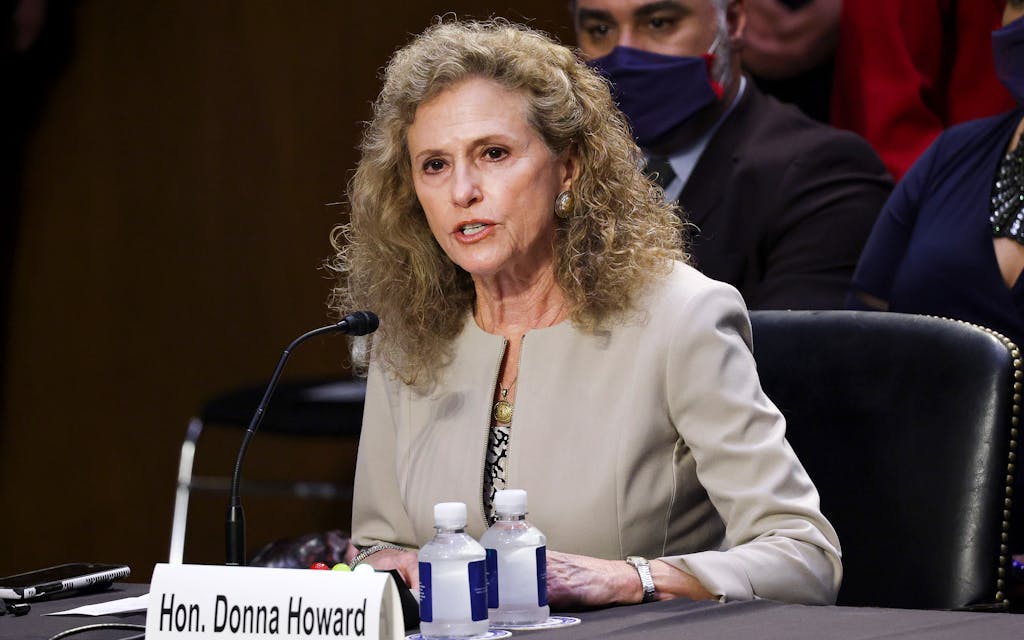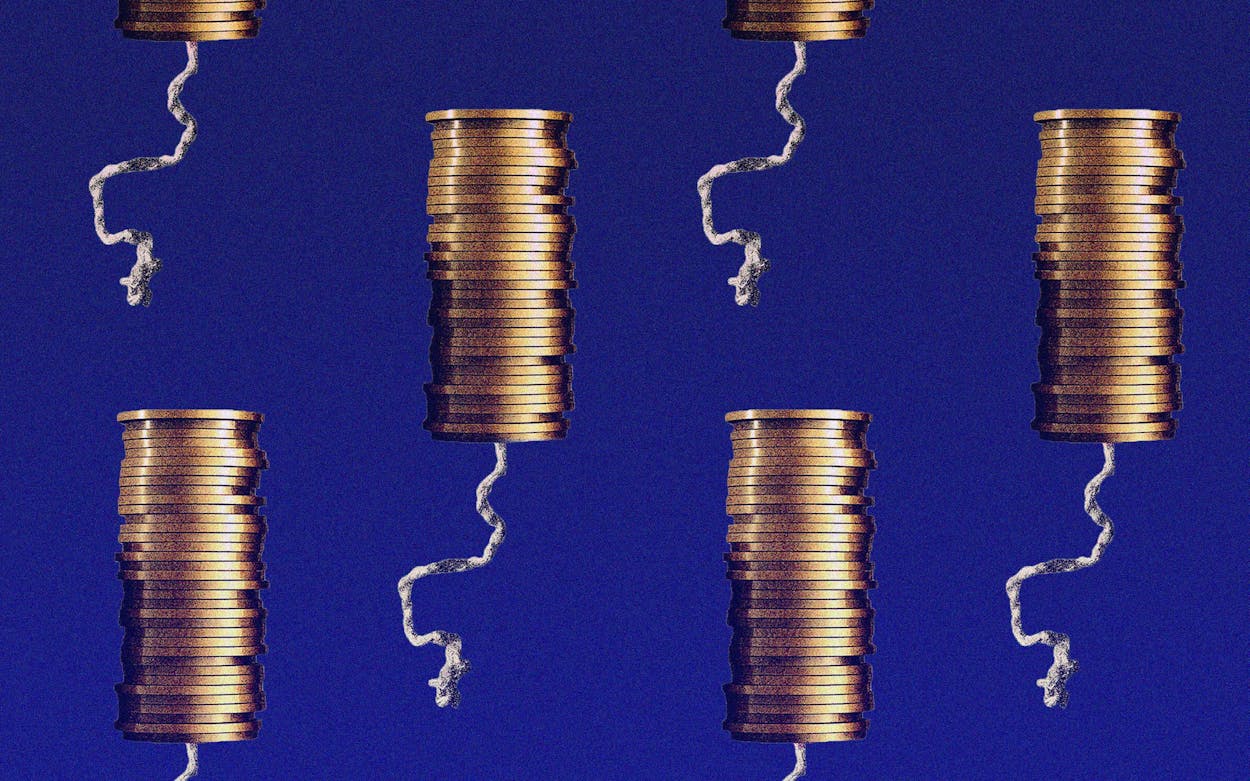Most every woman has, in her lifetime, suffered the indignity of getting her period in the wrong place at the wrong time. When Democratic state representative Donna Howard was a seventh grader in Austin in the early 1960s, hers started one day in the middle of class. “Back then, we wore dresses all the time,” she told me, “unless it was a snow day, and then we got to wear pants.” When she stood up, the bloodstain showed through the back of her skirt. Her classmate—a boy, whom she noted was a platonic friend (“We were buddies”)—noticed and pulled her aside to quietly let her know. He then escorted her to the nurse’s office, positioning his body to shield her from being seen by others. “I’ve never forgotten that,” she said, “especially for that day and time—for a boy to do that.”
For some, bleeding through one’s clothes is simply an unavoidable fact of life, the burden of which no benevolent boy can buffer. They experience what’s called “period poverty,” because menstrual products are expensive—a 34-pack of tampons will set you back about eight dollars, the same for a pack of pads—and many of those who menstruate (two out of five nationwide) have struggled to afford them. But while most folks who have periods can collectively agree that there’s nothing luxurious about them—certainly not with all their associated discomfort, including cramps, bloating, headaches, and nausea—period products are taxed as luxury (nonessential) goods in nearly half of all states, Texas included, making them inaccessible to many who live near or below the poverty line. In Texas, tax-exempt items run the gamut, from basic foodstuffs such as milk, bread, and cheese, to kolaches, doughnuts, and pies (arguably much more luxurious than a DivaCup), to over-the-counter drugs and supplements—even hot tubs, provided that they’re prescribed for therapeutic purposes.
Howard has been fighting to repeal the sales tax on menstrual products ever since she became aware of the issue in 2017, six years and four legislative sessions ago. “There was a universal consciousness-raising that happened around that time,” she said. It was the year that the National Diaper Bank Network, a nonprofit dedicated to supplying diapers and other essential items to families in need, decided to expand its distributions and advocacy to menstrual products (it launched the Alliance for Period Supplies the following year). It was also the year of the Women’s March on Washington and hand-knitted pink pussyhats, the year when actress Ashley Judd stared down the hundreds of thousands who gathered near the U.S. Capitol and recited a poem penned by a young Tennessee woman named Nina Donavan, calling out to the crowd, “Tell me, why are pads and tampons still taxed when Viagra and Rogaine are not?”
Howard discovered a number of other critical items that were subject to sales taxes, including breast pumps, maternity clothes, and diapers—not just baby diapers, but adult diapers for urinary incontinence, which affects twice as many women as men. Even women’s blouses were charged more at a dry cleaner’s than men’s shirts—“for no reason,” Howard said. This is what’s commonly referred to as the “pink tax,” the tendency for goods and services marketed toward women to be more expensive than those geared toward men. “I read up constantly about things where women’s items were being treated differently in terms of the sales tax and the cost,” she said. Howard decided to focus first on the tax on menstrual products. “This to me seemed like one of the most important to look at, to make a statement that we weren’t going to be discriminating against a natural event that occurs in a girl’s and woman’s life—that she shouldn’t be unfairly taxed for a medical necessity,” Howard said.
While menstrual products are mostly used by women, Howard said, “We still have a situation where the majority of policy makers have been men. Whether people believe that there’s a relationship there or not, I do think that prioritizations are different.” In 2017, women held just 37 seats in the Legislature—slightly more than 20 percent. That number has grown to 54 this session, or nearly 30 percent. Part of the challenge with an issue like the tampon tax, Howard said, is that the subject still embarrasses some lawmakers. “I can tell you that some of my male colleagues in particular kind of cringe when I go up to lay out these bills and I say ‘menstruation,’ ” she said.

Despite that stigma, Howard wasn’t the only one to file a bill to repeal the tax on menstrual products in 2017. Six other lawmakers floated legislation that same session—two in the Senate and four in the House, including Republican representative Drew Springer, a Christian conservative from Muenster, who’s now in the Senate. Howard filed a separate bill that would eliminate the sales tax on diapers for babies and adults. Neither of her bills—and none of the others’—made it through the chamber that year; in fact, they never even got committee hearings. But in each session since, Howard has come a little closer to passing the legislation. In 2019, both of her bills got hearings, though both were left pending in committee. In 2021, her bill on period products passed out of the Ways & Means Committee but was never scheduled for a vote of the full House.
State representative Angie Chen Button, a Republican from Richardson, recalled what happened in 2021, when Howard’s tampon-tax bill was heard by the Ways & Means Committee and several women testified in support. “I was so moved when a couple teenagers started to talk about their personal experience because of their financial situation,” said Button, who filed her own bill this session to remove the sales tax on menstrual products. She hesitated for a moment, as though considering whether to go on. “Well, I guess I can talk to you because you’re a woman, so you understand.” She continued: “They had to use toilet paper. Then I remembered, growing up in Taiwan, in a very humble environment, when I was thirteen or fourteen, I was using—well, you can’t even classify it as toilet paper—just that kind of brown paper towel that’s real rough.” Hearing those women speak, Button said, “just kind of touched me.”
Each Wednesday afternoon, from 3:30 to 5:30 p.m., the Covenant Food Pantry in North Austin apportions crates of food and other provisions to between 200 and 240 families. When I arrived on a recent Wednesday around 4, a line of a couple dozen families snaked outside the front door. “They’re just registering,” said Bob Weeks, the director of the food pantry, who calls the donees his “clients.” Those in need of diapers were handed pink tickets. In the basement, where food is distributed, volunteers manned tables stacked with crates of carrots and oranges and potatoes alongside dry goods like rice and boxes of spaghetti. The pantry runs a tight ship, with families in constant motion, moving down the line, packing their carts to the gills—a bag tearing here, an errant onion tumbling there. Babies were everywhere: babies in strollers, babies in shopping carts, babies in holsters.
Maja Nipper was in charge of the diaper and tampon station, where three plastic tubs contained diapers organized by size. Next to these sat baby wipes, cans of baby formula, and the electrolyte drink Pedialyte, along with a tub of menstrual supplies divvied up into Ziploc bags. Almost every woman who passed through stopped there to hand Nipper her pink ticket, in exchange for which she received a package of 25 diapers in the size of her choice. Nipper told me the pantry had implemented the ticket system to prevent families from taking more than their share, since the supply is limited. The diapers and menstrual supplies are donated by the Austin Diaper Bank. Still, Nipper said, “We never have enough.”
I witnessed this firsthand. By five o’clock, Nipper and the other volunteers were already down to just the smallest size of diapers, intended for infants weighing between eight and fourteen pounds. A young woman stopped to hand Nipper her pink ticket. “What size?” she asked. “Six,” the woman responded—the size for toddlers who weigh more than 35 pounds. Nipper shook her head. “We don’t have any. Only size one.” The woman shrugged and took the smaller ones.
Monserrat Lopez, 34, was there with her husband and five-week-old baby. Before she gave birth, she worked in a bakery, making cakes. She was unsure when she could return to work, because she doesn’t have anyone to take care of the baby. Lopez’s husband, who works as a restaurant cook, provides their sole source of income. “It’s a big help for us getting some extra diapers,” she said, noting that the 25-pack will last them two or three days. Nicole Caballero, 26, was also picking up diapers for her seven-month-old son, as well as a bag of pads. Laughing nervously, she told me that when she doesn’t have access to menstrual supplies, she uses wadded-up toilet paper instead.
The discomfort of fashioning deficient DIY menstrual protection, or bleeding through one’s clothes, is only part of the problem for women like Caballero. Wearing a pad or tampon for too long because you can’t afford a new pack can lead to complications such as toxic shock syndrome. Diapers left on for too long can cause diaper rash or urinary-tract infections. “Then you kind of continue that cycle of being in the doctor, the doctor bill adding to your already-limited budget,” said Holly McDaniel, the executive director of the Austin Diaper Bank, a member of the National Diaper Bank Network. “And that cycle of poverty just continues.”
When we spoke on the phone, McDaniel had a confession: “I’ll admit even when I was in high school, I used to hide a tampon in my pocket when I would walk to the bathroom. Or my sleeve,” she said. “I think maybe we need to change the way we talk about it and think about it and the way we’re raising the next generation, our children.” When her son started middle school, McDaniel made him carry pads and tampons in his backpack, in case his menstruating friends needed them. “He was a little mortified at first,” she said.
In 2021, one in four U.S. teens who menstruate reported having missed class due to a lack of access to period supplies. Students of color, lower-income, and rural students are disproportionately affected by period poverty. In a 2021 nationwide survey conducted by Thinx, a company that sells period underwear, and Period., an organization that distributes menstrual products to those in need, 16 percent of more than a thousand teenage menstruators said they had chosen to buy period supplies instead of food or clothing as a result of the COVID-19 pandemic, and more than 50 percent reported wearing period products for longer than recommended.
Alison Landolt, who offered written testimony in support of Howard’s bill in 2021, highlighted the quandaries those one in four menstruating teens face: “How long can I go before I bleed through my clothes? How long can I stretch this tampon or pad? Can I make it an hour? Can I make it two hours today?” Landolt, who lives in the Houston suburb of Pasadena, suffers from endometriosis, a condition that causes excessively heavy periods. “Growing up,” she wrote, “I was 1 in 4 menstruators who struggled to afford menstrual hygiene products. . . . I could not afford to change my pads as often as necessary, and I could not afford to go without changing them.”
Across the state and country, a “period equity” movement, led by student organizers and activists, has been gaining momentum. In 2021, the Texas Menstrual Equity Coalition, a group of young organizers and advocates, requested a determination from the state comptroller’s office that menstrual products fit the state’s definition of tax-exempt “wound care dressings.” In the tax regulation code, the term refers to any product that “absorbs wound drainage, protects healing tissue, maintains a moist or dry wound environment (as appropriate), or prevents bacterial contamination.” (No determination has been made.) But while state action is still pending, a few local governments and school boards have stepped up. Last year, a citywide program was launched in Dallas to supply free menstrual products in libraries and public buildings. The same year, the Austin City Council passed a similar provision and Fort Worth followed suit. And before the start of the current school year, Austin ISD equipped its middle and high school restrooms with free tampons and pads.
Across the country, states have been pushing tampon-tax legislation through. Even Florida, despite its lawmakers’ right-wing bent, removed its tax on menstrual products in 2017, and last year alone, another four states were added to the list of tax-exempt states. The path hasn’t always been linear: in 2019, Utah legislators passed a law to remove the tax on menstrual products as part of a larger tax reform package, only to repeal the package the following year. This year, a Florida lawmaker introduced a bill that would prevent teachers from disseminating any sex education–related material prior to the sixth grade, meaning that a little girl who got her period in, say, the fourth or fifth grade wouldn’t be able to talk to her teacher.
Howard has good reason to be optimistic that this is the year her bill—which she expanded from past iterations to include not just menstrual products and diapers, but also baby wipes, baby bottles, maternity clothing, and breast-pump equipment—will become law. It has already passed out of committee on a unanimous vote across party lines, and House Speaker Dade Phelan made House Bill 300 one of his priorities this session. “It is essential that the Texas House makes meaningful progress this year on better supporting mothers and children in the state,” Phelan said in a press release that touted the bill, among others. Earlier this year, Governor Greg Abbott also signaled his support for the legislation, promising to sign the bill if it makes it to his desk. “I don’t have any doubt at all that it’s going to get through the House,” Howard told me a couple of weeks ago in her Capitol office, where a painting of four old ladies who look up to no good (one woman’s knee-length hosiery is slipping, while another is picking her teeth) hangs near the entrance. On Tuesday, she was proven right, as HB 300 passed the House. It awaits a procedural vote before heading to the Senate.
Prominent Republicans in the Senate have expressed their support for repealing the tampon tax as well. Senator Springer filed separate bills that would make menstrual products and diapers tax-exempt, and he told Texas Monthly he would support Howard’s bill. Springer also coauthored another tampon-tax bill filed by Senator Joan Huffman, of Houston, who got every female senator to coauthor the bill. “Every woman knows that these products are not optional,” Huffman said in a release touting her bill. “They are essential to our health and well-being and should be tax exempt.”
In the wake of the near-total state abortion ban that kicked in following the Supreme Court’s overturning of Roe v. Wade, Howard believes the stars have aligned for her bill in another critical way. “With all the court actions, and no longer having access to abortion,” she said, “there has been, among some—certainly the leadership of the House—a concerted effort to demonstrate support for moms and families.” She added, “They have been accused of being pro-life just until the baby’s out of the womb. I think they’re very geared up and ready to show that they’re pro-life after that.” Though Button was initially wary of how many items Howard included in her bill, which would equate to a greater cost for the state—nearly $195 million over a two-year budget cycle, as estimated by the Legislative Budget Board—she says she’ll vote for it, and agrees that the odds of passage are good. “I think this session, we are in the right spot,” she said, “and it’s the right time to finally push this through to the finish line.”
The abortion ban will inevitably heighten the demand for certain maternity items like diapers, wipes, and formula, as birth rates rise because of the ban, particularly among some of the state’s poorest, who lack the option of traveling out of state for abortions. “We’ve already seen an increase of families who need our help,” said Troy Moore, the chief of external affairs for the National Diaper Bank Network. “I have no doubt it’s because of some of the laws here in Texas.”
Howard is seizing the opportunity to turn lemons into lemonade—the kind that has a somewhat bitter aftertaste. “We’re not going to repeal the abortion laws,” she said. “That’s just not going to happen, at least not at this point in time. So what I want to do is I want to mitigate as much of the damage as I can, and I want to ensure access to health care. Both of those things have more of a possibility with my Republican colleagues who are really wanting to show that they are, in a more global sense, pro-life.”
Back at the Covenant Food Pantry, as distribution time wound down, a woman named Connie Dasse hugged me like she’d known me for years and asked Nipper to pray for a friend who’s in the hospital. Dasse gestured toward the pads and asked, “Can I get some of those?”
When I told her about the tampon-tax bill, Dasse said, “I am glad it’s being talked about, because it’s a natural thing and nobody should be ashamed. They have them free at schools now,” she noted. “They didn’t have them when I was in school. They had dispensers you had to pay for—and who has a quarter, anyway?”
- More About:
- Politics & Policy
- Health
- Texas Legislature
- Austin








